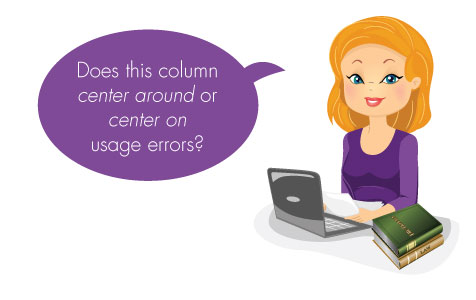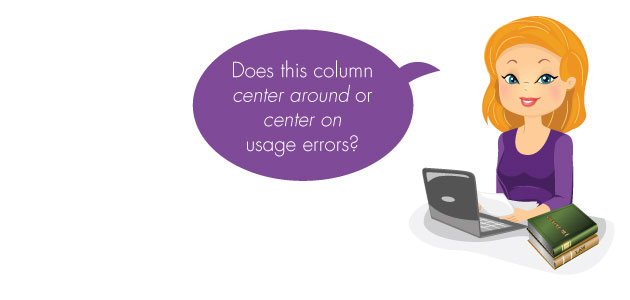 Since writing last month’s column on the importance of regularly consulting a usage guide, I’ve become more aware of the prevalence of particular mistakes in word choice. It seems like they’re everywhere these days—especially on the Internet where articles and essays often appear without the benefit of a pre-publication read-through by a seasoned editor.
Since writing last month’s column on the importance of regularly consulting a usage guide, I’ve become more aware of the prevalence of particular mistakes in word choice. It seems like they’re everywhere these days—especially on the Internet where articles and essays often appear without the benefit of a pre-publication read-through by a seasoned editor.
Here’s one I’ve seen more than a few times over the past weeks: center around instead of center on.
Applying a little logic is helpful here. How can something center around something else and still be in the center? It can’t. One thing can revolve around another, as in “the discussion revolved around the issue of liability.” But the center is a fixed point. It cannot physically exist around something else. The proliferation of center around is not a good thing. The phrase remains nonsensical. Stick with center on.
Another commonly made error is writing compare with where the context calls for compare to or vice versa. Use compare with when noting the differences and similarities between two things. Choose compare to when pointing only to similarities, as when Shakespeare asks, “Shall I compare thee to a summer’s day?”
Along the same lines, we might ask: is one thing different from another, or is it different than?
Most of the time, different from is the correct choice, e.g., “This case is different from People v. Smith.” Than should appear after a comparative adjective, as in “She had a personality larger than life.” Sometimes, when a phrase is followed by a clause, as opposed to a noun, different than is the less awkward construction: “His view of the meaning of consideration is considerably different than it was before he went to law school.”
Due to (due to the fact that) or because?
Almost always, the wordy due to the fact that can be replaced with the one word, because. Increasingly these days, due to appears instead of the conjunctive adverb meaning “as the result of,” “caused by,” or “owing to.” If one thing occurred as a result of another, say it happened because of the other. That is the stronger construction.
When is it better to ensure than assure?
While it’s common for these two words to be used interchangeably, they do not carry exactly the same meaning. Use assure when you mean “promise to” or “convince,” as in, “He assured her he would water the plants while she was gone.” Go with ensure when you mean, “make certain,” e.g., “The Bill of Rights ensures protection against illegal search and seizure.”
On that note, I assure you we will work more on usage issues next month.
About the author:
Savannah Blackwell is a former news reporter who covered government and politics for more than a decade, mostly in San Francisco. She became a licensed California attorney in 2010 and specializes in legal research and writing. She can be reached at savannah.blackwell@gmail.com. Follow her on Twitter at @SavannahBinSF.


